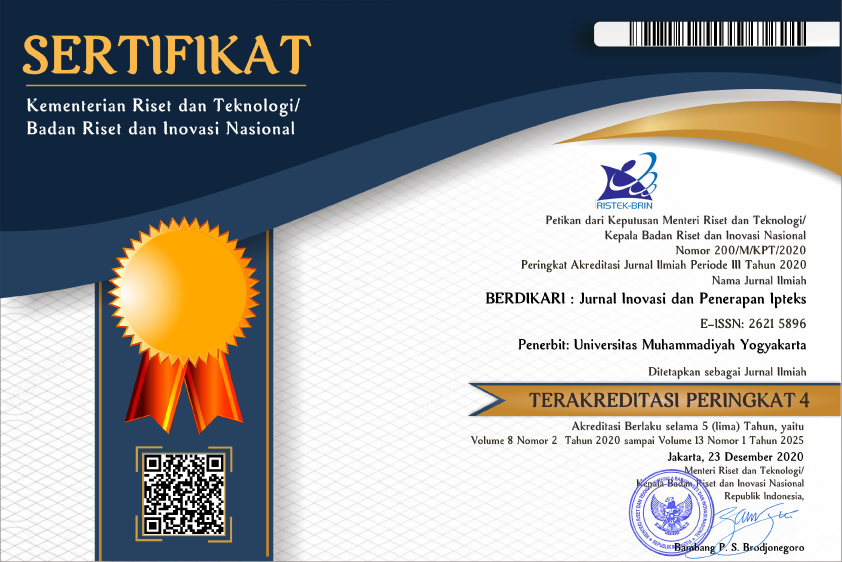Pendidikan Paralegal Bagi Masyarakat Sebagai Wujud Pemenuhan Hak Asasi Manusia Berkelanjutan
DOI:
https://doi.org/10.18196/berdikari.v9i1.10853Keywords:
Education, Paralegal, Human RightsAbstract
Paralegals are parties that can provide advocacy or legal assistance to the people in a broad sense beside advocates, lecturers and other legal activists. The role of paralegal itself is not intended to replace the function of an advocate. Instead, it is aimed to be able to cooperate in the fulfillment of access to justice for the society, especially the people who are poor and other vulnerable groups. In Indonesia, paralegal position is a voluntary activity in conducting empowerment process in the society. The beginning of this article will invite and provide understanding to readers to understand the definition and comprehension of paralegals, types, and their important role for the fulfillment of access to justice which is one of the most basic parts of human rights. Beside preparing a law-conscious society, paralegals also provide human rights protection to people who are having problems with law, until the stage of investigation in the police office. The villagers trained will get certification and verified by the government. The society service uses educational methods or approaches that are oriented to problem solving process using the pattern of education elements conducted systematically, directed and planned with the active participation of individuals, groups and society as a whole to find ways to solve problems faced by the society by paying attention to the surrounding socio-economic and local cultural factors. This approach is considered to be able to move the society dynamically towards progress as expected. Meanwhile, being participative is an approach that emphasizes on the efforts to increase the participation of the society or individuals directly in various processes and implementation of programs. The results of the service program are demonstrated with the establishment of a paralegal society, increased awareness and knowledge of the society on their rights in the field of law
References
Gardner, Howard, 2009, Five Minds for the Future, Massachusetts, Harvard Business Press Books.
Kirk Warren Brown dan Richard M. Ryan, 2003, “The Benefits of Being Present: Mindfulness and Its Role in Psychological Well-Being”, Journal of Personality and Social Psychology, Vol. 84, No. 4, Washington D.C., American Psychological Association.
Novia Fetri Aliza, 2018, “Pendampingan Remaja Melalui Empowering Community Psychology Untuk Meningkatkan Orientasi Masa Depan”, Berdikari Jurnal Inovasi dan Penerapan Ipteks, Vol. 6, N0. 2, Yogyakarta.
Orr, Debora, 2014, “The Uses of Mindfulness in Anti Oppressive Pedagogies: Philosophy and Praxis”, Canadian Journal of Education, Vol. 27, No. 4, Canada, Canadian Society for the Study of Education.
Robert Hogan dan Joyce Hogan, 2003, “Assessing Leadership: A View from the Dark Side”, International Journal of Selection and Assessment, Vol. 9, No. 1, New Jersey, Wiley.
Sigalingging, Abdul Azis, (et-al), 2015, Paralegal Berbasis Organisasi Rakyat: Aktor Kunci Gerakan Bantuan Hukum Berbasis Komunitas, Padang, LBH Padang.
Victor Dulewicz dan Malcolm Higgs, 2005, “Assessing Leadership Styles and Organizational Context”, Journal of Managerial Psychology, Vol. 20, No. 2, Melbourne, Emerald Publishing Pty Limited.
Widjajanti, Kesi, 2011, “Model Pemberdayaan Masyarakat”, Jurnal Ekonomi Pembangunan, Vol. 12, No. 1, Solo, Muhammadiyah University Press.
Winata, Frans Hendra, 2011, Bantuan Hukum di Indonesia: Hak untuk Didampingi Penasehat Hukum bagi Semua Warga Negara, Jakarta, PT. Gramedia.
Zinn, Jon Kabat, 2006, “Mindfulness Based Interventions in Context: Past, Present, and Future”, Clinical Psychology Science and Practice Journal, Vol. 10, No. 2, New Jersey, Wiley.
Downloads
Additional Files
Published
Issue
Section
License
Copyright
Authors retain copyright and grant BERDIKARI Jurnal Inovasi dan Penerapan IPTEK the right of first publication with the work simultaneously licensed under an Attribution 4.0 International (CC BY 4.0) that allows others to remix, adapt and build upon the work with an acknowledgment of the work's authorship and of the initial publication in BERDIKARI Jurnal Inovasi dan Penerapan IPTEK.
Authors are permitted to copy and redistribute the journal's published version of the work (e.g., post it to an institutional repository or publish it in a book), with an acknowledgment of its initial publication in BERDIKARI Jurnal Inovasi dan Penerapan IPTEK
License
Articles published in the BERDIKARI Jurnal Inovasi dan Penerapan IPTEK) are licensed under an Attribution 4.0 International (CC BY 4.0) license. You are free to:
- Share — copy and redistribute the material in any medium or format.
- Adapt — remix, transform, and build upon the material for any purpose, even commercially.
This license is acceptable for Free Cultural Works. The licensor cannot revoke these freedoms as long as you follow the license terms. Under the following terms:
- Attribution — You must give appropriate credit, provide a link to the license, and indicate if changes were made. You may do so in any reasonable manner, but not in any way that suggests the licensor endorses you or your use.
- No additional restrictions — You may not apply legal terms or technological measures that legally restrict others from doing anything the license permits.




